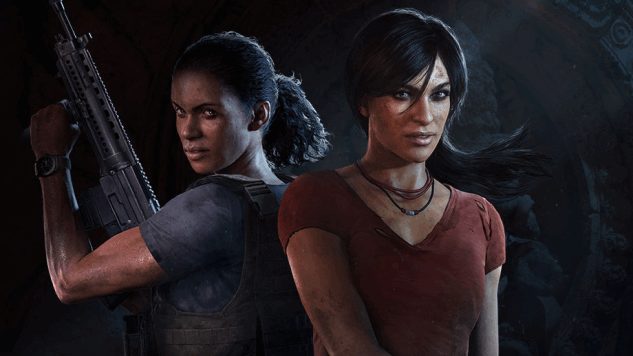The 10 Best PlayStation 4 Games of 2017

For the first year since it came out four years ago, the PlayStation 4 had some real competition in 2017.
For me and many other game critics I know who don’t play on a PC, the PS4 has sort of been the default console this generation. It’s all just a matter of preference—I’m not saying the PS4 is inherently better than the Xbox One, or anything—but when it came to third party games on multiple systems the PlayStation 4 version was basically what everybody I knew would gravitate towards.
That changed with two things. Nintendo launched the Switch in March, and with its fantastic Nintendo software and true handheld functionality, it was an instant smash. It almost immediately became my preferred destination for any game that might be available for it. (It’ll be very interesting to see how sales break down per console once more third party games launch for the Switch at the same time as the PlayStation 4 and Xbox One.) And then late in the year Microsoft released the Xbox One X, which is custom-tailored for 4K TVs (like the PlayStation 4 Pro) but with greater processing power, which lets games run at higher frame rates with greater consistency than the PS4 Pro. It’s not a massive jump on the competition, but if you’re looking for the most powerful gaming system on the market, and don’t want to deal with the fuss of building your own gaming PC, the Xbox One X has a step up on the PlayStation 4 Pro.
Still, the PlayStation 4 wasn’t left in the dust, or anything. It just means there’s greater parity in the console sphere than we’ve seen in many years. The PS4 had a fantastic roster of games in 2017, from such exclusives as Persona 5 and a new Uncharted adventure, to thoughtful smaller budget games like Night in the Woods and What Remains of Edith Finch. If you don’t have a gaming PC, it was also the only way to play the brilliant and idiosyncratic Nier: Automata, one of the best games of the last several years.
Here’s our list of the 10 best games that came out on the PlayStation 4 this year. We aren’t limiting this to games that were exclusive to the system; we’re looking at the full lineup from 2017, and focusing on the games that most need to be experienced by anybody into videogames as an entertainment medium and an artform. And we start with a game that introduced a new depth and level of emotional intelligence into one of Sony’s biggest franchises.—Garrett Martin
10. Uncharted: The Lost Legacy
The Lost Legacy isn’t the best Uncharted since Uncharted 2 (and the second best overall) just because it replaces the increasingly annoying Nathan Drake with two strong women of color who don’t maintain a constant stream of sitcom-level chatter. That certainly doesn’t hurt, though. The game takes its subtitle seriously. Yeah, it’s another would-be action film full of bullets and improbable parkour, but it has greater depth because it explores the lives of its co-leads, Chloe Frazer and Nadine Ross, and shows how they’re both grappling with the legacies of their fathers and the decisions of their youth. By shifting the focus to these two characters the Uncharted series has struck a narrative vein richer than anything it’s explored in the past.—Garrett Martin
9. Wolfenstein II: The New Colossus
Perhaps the most enjoyable aspect of Wolfenstein II is its simplicity. Today’s first person shooters are all but bogged down by overstimulating user interfaces that distract from the experience. Wolfenstein II, keeping intact its legacy as one of the first proper shooting games, is almost minimalist by comparison. The end result is a fluid experience that encourages forward momentum and continually rewards the player for tackling conflict head-on and at high speed. This is not to say that the game’s stealth elements go underused or ignored. Those too are understated and generally unsaddled with the many tweaks and innovations made to its genre in the past two decades. Whatever method used to tackle a mission, the ensuing rush is completely satisfying.—Holly Green
8. Gnog
KO_OP’s candy-colored Gnog is as much of an interactive toy box as a game, especially in VR. It situates its puzzles in a series of three-dimensional boxes that have to be poked, prodded, turned and explored as you try to figure out the exact right way to interact with it. With its fanciful, lightly psychedelic images, and its warm electronic score, Gnog is a soothing multimedia treat.—Garrett Martin
7. Horizon Zero Dawn
Guerilla Games’ Horizon Zero Dawn looks like a living nature painting. As the player runs or rides from one settlement to another, the landscape constantly shifts between distinct, gorgeously realized biomes. One minute, it’s a frozen tundra, with sun gleaming off enormous white, snow-covered cliffs, and ground covered in scraggly little bushes and errant branches. The next, it’s an orange sanded desert with towering red clay mesas jutting up into a perfectly clear blue sky. In each, birds and foxes, boar and rabbits frolic. (And, because Zero Dawn is science fiction, herds of robotic bulls, flocks of giant metal birds or a lone, lumbering cybernetic tyrannosaur.) The world is genuinely stunning, a place that wants simply to be soaked in—observed and inhabited. It is our planet in miniature. It’s the globe shrunk down and captured in a videogame console. Sweep the in-game camera around a landscape and it’s almost possible to smell the air or feel the warmth of the sun.—Reid McCarter









